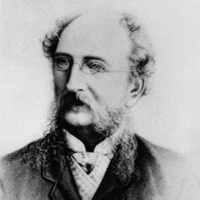A Historical Problem
KING AHASUERUS in his palace at Shu-Shàn
Gave a feast unto his princes, Tarshish, Meres, Memucàn,
And some others whose outlandish names it boots not to rehearse—
You will find them all in “Esther,” chapter First, and fourteenth verse.
And when the feast was at its height, and jest and story flew,
And reverberant laughter shook the hangings, white, and green, and blue,
Ahasuerus hammered with his sceptre on the board,
And at the royal signal silence promptly was restored.
“Great lords, our Privy Councillors,” the mighty monarch said,
“The chiefest of our provinces is now without a head;
“Assyria is vacant; and we ask you, who is he
“Who worthiest is to rule the roost in that great Satrapy?”
Then one named one; another, one; till all had said their say;
But at each name the monarch shook his head and answered “Nay.
“Ye only think,” he cried, “of high degree and princely birth;
“Hen-w―y-nor is the man for Us, whose claim is simply—worth.”
Hen-w―y-nor! At the name there burst so joyful a hurroo
That the palace-hangings swayed in curves of white and green and blue;
And, waving golden goblets, Tarshish, Meres, Memucàn,
Etcetera, shouted “Live the King! Hen-w―y-nor is the man!”
Now, Hen-w―y-nor was a modest chief, who ruled a scanty folk,
And his soul was filled with wonder when the news upon him broke
(Which proves, if proof is wanted, that a man may be alert
And wideawake to everything except his own desert).
The war-worn hero fain had put the glittering prize aside,
But Duty called with trumpet-tone and would not be denied,
And at the old familiar sound his answering spirit leapt,
And his posts were straightway flying with the message “I accept.”
And his people—ah, his people!—they were glad and they were sad:
They were proud and yet cast down: the news was good, the news was bad.
Each felt higher by a cubit, and yet lower by a head,
And they bragged of his promotion, mingling tears with what they said.
But where all sincerely sorrowed, Persian chroniclers agree
That the saddest of the mourners were the Civil Scribery—
A superior class of men, who, these same chroniclers declare,
Were the best of all good fellows in that land—or anywhere.
Now the Scribery had a custom, quite peculiar to this folk,
To give departing friends an apotheosis of smoke;
So they waited on the Satrap, and besought him to submit
To the process on such evening as His Altitude thought fit.
“ ’Tis small honour we can render,” said the scribe who spoke their views;
“We are poor, Sir—devilish poor—with ten per centum off our screws;
“But we’d fain give you a pleasure to remember when you’re gone”—
And the kindly Satrap bowed his honour’d head, and said “I’m on.”
But when the deputation had departed, there came near
A stealthy-footed chamberlain who whispered in his ear,
“There s a Farewell Ode included in the pleasure they prepare!”—
And the hero of a hundred fights dropped back into his chair.
Yea, he whose eye had ever in fierce conflict brightest glowed—
He who before had ne’er known fear—now quailed before the Ode!
And he cried, “Is there no outlet from this horrible abyss?
“Chillianwallah, Delhi, Gujerat, were not a patch on this!
“Yet stay!”—for now a happy thought took shape within his brain—
“You cannot Farewell-Ode a man who chooses to remain!”
Oh, blessed inspiration! the solution clear he saw!
And out he rushed, and wired Ahasuerus, “I withdraw!”
* * * * *
Exit Farewell Ode. But synchronously with its exit came
A new problem into history that still preserves his fame,
For historians still dispute the question, each with some fresh lie,
Why Hen-w―y-nor slung Assyria—But we know the reason why.

